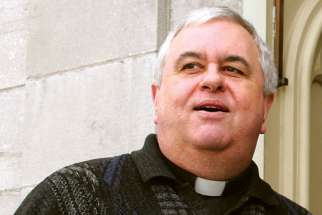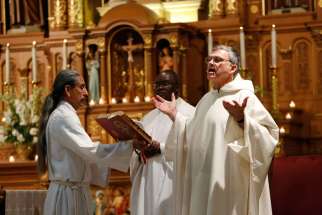BOSTON - As the trial of Boston Marathon bombing defendant Dzhokhar Tsarnaev went to the jury April 6, the Catholic bishops of Massachusetts released a statement reiterating the church's teaching on the death penalty.
CCCB to keep Synod survey results private
OTTAWA - The Canadian Conference of Catholic Bishops (CCCB) released a revised set of questions Feb. 10 for the upcoming Synod on the Family, but maintain that the consultations’ results will stay private.
Homilies must challenge, says new Vatican document
VATICAN CITY - A homily at Mass is not a mini catechism class, the Vatican says in a new document on homilies, but it is an opportunity to explain Church teaching using the Scripture readings and the Catechism of the Catholic Church.
Catholic beliefs are not open to popular vote, pope says
VATICAN CITY - When the Catholic Church affirms the importance of how all the faithful understand matters of faith and morals, it is not saying Catholic beliefs are open to a popular vote, Pope Benedict XVI said.
Study group to study youth catechism
MARKHAM, ONT. - A new youth study group aims to help young Catholics find answers to their questions about faith.
The Salesian Sisters are inviting Toronto-area youth age 15 to 35 to study the youth catechism from October to July. Sr. Corazon Beboso will be running the program at the Don Bosco Centre in Markham.
“The Catechism of the Catholic Church is more for adults, for bishops, for priests,” said Beboso, who calls it “very theological.” In contrast, the YouCat, or youth catechism, targets youth to deepen their faith.
Pope Benedict XVI presented the YouCat as a gift to World Youth Day 2011 pilgrims in Madrid, Spain.
“The YouCat study group is not a training program. It’s not a prayer group,” she said. “It is a young adult-led discussion sharing session wherein they come, they bring their questions, they bring whatever impact the world has on them... (and) they place it at the table for discussion depending on the topic that we have chosen.”
But Beboso promises prayer will be incorporated.
“There’s a bit of fun too because we have to make use of the things that are happening around, and then afterwards we pray, we stop and say what does the catechism say?” she said.
The study group is an offshoot of a discernment program that started last year. Called Duc in Altum (put out into the deep), the title is based on Luke 5:4-11, which refers to going farther to catch fish.
“So for us the fish that we want to catch with these young adults is know yourself, know your relationship with God, know your faith, know the Church and what the Church expects from you,” Beboso said.
After the discernment program, the participants wanted to know what was next.
“I said why don’t we make this study group as a response to the invitation of the Holy Father to make 2012-2013 the Year of Faith.” And so the YouCat study group was developed.
Beboso hopes the program will help participants figure out “how our quest for the truth is wrapped in the language of young people’s experiences today.”
Registration is $30 for the entire program. The price includes a copy of the YouCat and the balance is a participant’s contribution to the program. But those who come with their own print or e-book copies are asked to make a small donation. Currently, salesiansisterscanada.com lists 19 sessions at about two sessions a month, the first of which was held on Oct. 1.
Beboso believes youth are attracted to this type of group not only because they are looking for precise answers to the questions they have about the faith.
“They’re also attracted because there are other young people who are searching like them,” she said. “They don’t have the language... to express the faith. They know mentally because many of them are cradle Catholics... So they want to study together with others.”
Catechism, at 20, maintains importance as a resource for Catholics
The Catechism of the Catholic Church is the best comprehensive presentation of the Catholic faith in hundreds of years, said Vancouver Archbishop Michael Miller.
"It's the distillation of the teaching of the Second Vatican Council," said Miller.
The 20th anniversary of the promulgation of the Catechism of the Catholic Church runs parallel to the Year of Faith, which kicked off Oct. 11.
Today, the catechism is used in various settings, including RCIA programs, upper- level high school or college courses, study groups and as a personal reference tool, said Miller.
"And references are constantly made to it in books that you read on homiletics and preaching."
It's an important resource because it brings together the core teachings of the Catholic Church under three categories: the Church's doctrinal positions, Christian practices and worship, said Michael Attridge, a theology professor at Toronto's University of St. Michael's College.
But if people believe the only thing necessary to live a good, full Catholic life is to read the catechism, that is a downside, said Attridge.
"People need to study the Bible, they need to involve themselves in parish organizations, organizations that promote social justice, they need to educate themselves by going to theological school and to ask questions that relate to faith and Christian living."
Since its creation, the publications service of the Canadian Conference of Catholic Bishops (CCCB) has sold 222,787 copies of the catechism in English and French, said René Laprise, director of media relations for the CCCB. In addition, 45,673 copies of the Compendium of the Catechism of the Catholic Church have been sold through the CCCB.
"A number of copies have been sold through Canadian bookstores and direct sales from publishers in the United States and France, although we have no way of determining how many," said Laprise.
Miller added that in the archdiocese of Vancouver, there's currently a big push on YOUCAT: The Youth Catechism of the Catholic Church.
"We've distributed more than 10,000 copies of YOUCAT to parishes because it's in some ways far more accessible and user-friendly for the level of knowledge of religion that most people have."
Had it not been for the anniversary of the catechism, Miller doesn't think the arch-diocese would have come up with such an initiative. And while the catechism is the standard, he said he believes YOUCAT is more in tune to how people today learn and read.
"As much as we might lament the loss — as I do — of plunging through big books, most people today read in small bits and they're used to more pictorial representations... It's just the way things are. I think it's far more effective."







